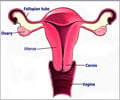China's status as a sporting superpower was achieved on the back of punishing state-led training in schools.

But sporting authorities in China have embarked on a period of soul-searching in recent years, which has led to a more relaxed training environment for the country's next generation of sports stars.
Eight-year-old Yu Zhengyang is one of thousands of youngsters in China who is motivated by his own sporting dreams rather than the demands of the state.
He said the decision to leave his family home in northern China to devote five hours a day to table tennis training at a school hundreds of miles away was an easy one.
"I want to go to the Olympics. I can play table tennis well so this is my dream. I can win the gold medal," Yu, now ten years old and two years into his training at Shichahai Sports School in Beijing, told AFP.
"I believe in myself that I can play well. I came here to practise more," adds the recently crowned champion of a major under-12s tournament in China, with one eye on the 2020 Olympics.
Advertisement
"I like it more now, living with my parents," he said.
Advertisement
China began to reassess its high-pressure training system after its rise to sporting superpower status was enshrined by the 51 golds it won at the Beijing Olympics in 2008.
Questions were asked over the true cost of this success, accompanied by widely circulated photos of small children crying in anguish during intense training sessions conducted with little time for rest or socialising.
Revelations this year that Olympic champion diver Wu Minxia was not told about her grandparents' deaths, or her mother's cancer, for fear of disrupting her training, prompted more concern over China's state sports system.
Questions were raised over the system after China's tennis chief recently blamed Li Na's failure to build on her stunning 2011 French Open victory on a lack of mental strength following her rigid state-organised training.
Sun Jinfang said the world number eight, who crashed out of the US Open following a poor run of form, was particularly vulnerable when under pressure on court, blaming this on the fact she had focused purely on sport from an early age.
Fears that China's athletes are being worked too hard were also raised -- often on China's Twitter-style messaging sites -- when star athlete Liu Xiang limped out of the 110m hurdles for the second consecutive Games in London.
Coaches and sports officials in China say they are now focusing on honing existing ambition and talent, rather than subjecting the country's youngsters to intense training regimes designed to secure victory at all costs.
"Students here don't have to do the tough training that we focused on before," Shi Fenghua, vice-principal of Shichahai, which has produced ten Olympic Champions, including three from the London Games, told AFP.
"What we focus on now is the training quality. We attach great importance to research we have done on this.
"We get coaches involved in scientific research groups which train them to improve a students' performance in less time than before. The general training quality is also improved."
Central to this new style of coaching is giving students time to relax and not pressuring them to win competitions, eight-year-old Yu's coach, Gu Yunfeng, said.
"Pressure is something that you give yourself as an athlete if you want to achieve your goals. It is not something that anyone else gives you," he told AFP.
After China's gold medal tally dropped to 38 at the London Olympics, chef de mission Liu Peng called the results "satisfactory" -- and praised China's non-medal-winning athletes for showing the Olympic values of fair play and sporting behaviour.
China notably lost ground in gymnastics in London, where they fell from seven gold medals in 2008 to just three.
But Shichahai gymnastics coach Jiao Gengbo said the key to developing sporting talent is to give children time away from the sports halls.
"I think it's really just about being rational. To train excessively is not the right way," he told AFP.
"We need to spend equal time on studying, relaxing, and training."
Source-AFP










